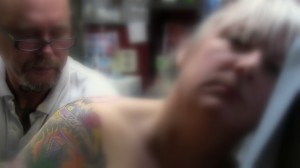






13 maart 2012, stills uit een werkfilm van Wouter van der Hoeven,
Tattoo Centre Alkmaar, Ron Rijks
In Norse mythology, a valkyrie (from Old Norse valkyrja “chooser of the slain”) is one of a host of female figures who decides who falls and dies in battle. Selecting among half of those who die in battle (the other half go to the goddess Freyja’s afterlife field Fólkvangr), the valkyries bring their chosen to the afterlife hall of the slain, Valhalla, ruled over by the god Odin. There, the deceased warriors become einherjar. When the einherjar are not preparing for the events of Ragnarök, the valkyries bear them mead. Valkyries also appear as lovers of heroes and other mortals, where they are sometimes described as the daughters of royalty, sometimes accompanied by ravens, and sometimes connected to swans or horses.
Valkyries are attested in the Poetic Edda, a book of poems compiled in the 13th century from earlier traditional sources; the Prose Edda and Heimskringla (by Snorri Sturluson), and Njáls saga, a Saga of Icelanders, all written in the 13th century. They appear throughout the poetry of skalds, in a 14th century charm, and in various runic inscriptions.
The Old English cognate terms wælcyrge and wælcyrie appear in several Old English manuscripts, and scholars have explored whether the terms appear in Old English by way of Norse influence, or reflect a tradition also native among the Anglo-Saxon pagans. Scholarly theories have been proposed about the relation between the valkyries, the norns, the dísir, Germanic seeresses, and shieldmaidens. Archaeological excavations throughout Scandinavia have uncovered amulets theorized as depicting valkyries. In modern culture, valkyries have been the subject of works of art, musical works, video games and poetry.
Reacties door alja
vaak ongewild
dank Frank
het verkeerde perkje
bij alles dat W. vertelt, zegt hij 'maak daar maar ...
hoe lief tegelijkertijd
dank Leonore
de 2e column voor de site van Pom Wolff
Hij is er nog, speelt piano en leest! Dank voor ...
mijn veiligheid
ik houd in alle opzichten meer van het suggestieve, x